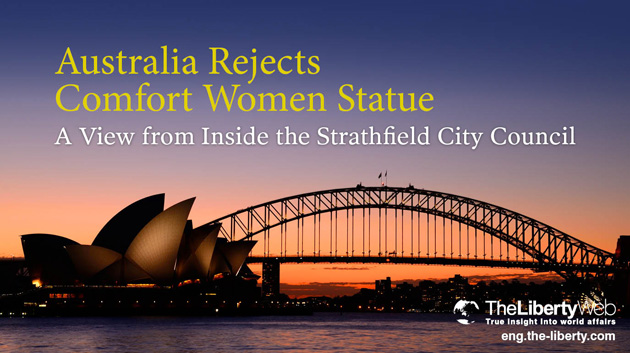Australia Rejects Comfort Women Statue:
A View from Inside the Strathfield City Council
On August 11th, in a town hall filled to capacity, the Councillors of Strathfield Council in Australia voted unanimously against the establishment of the “Comfort Women” statue, after hearing statements from those for and against the establishment of the statue. Four speakers from each side were randomly selected by a draw from a hat, including Australian migrant Brian Rycroft, who is a director of Happy Science Australia. He said it was thanks to the efforts of many people opposing the statue since 1 April 2014, that the statue was denied. Below is a transcript of his speech.
Honorary members of Strathfield Council,
Thank you for the opportunity to speak this evening.
My name is Brian Rycroft. I’m originally from South Africa but like many other people here tonight migrated to Australia and became an Australian citizen in 2010. It is here that I met my Japanese wife and just two months ago she gave birth to our first child. How differently we look at things when we become parents who want the best for our children’s future.
Tonight I speak against building a comfort-women statue in Strathfield. Clearly the proposal to build this statue is not in accordance with the Councils Memorial Policy. But I believe there are more important reasons to not go ahead with this. Most importantly, I question whether this is based on a true account of history. Why last year did the Japanese Newspaper, Asahi, admit that it falsely reported about comfort-women and officially apologized and retracted the series of articles previously published? Why is UNESCO now hesitating to go ahead with the inscription of comfort-women as a memory of the world? The answer can be found in the IWG Report – research undertaken by the US Government that took 7 years and 30 million dollars. It which could not find any evidence of forced prostitution. These findings are published as the IWG’s “Final Report to the US Congress on Nazi War Crimes & Japanese Imperial Government Records”.
I also question why this matter was considered alongside Nazi War Crimes? I came across a New York Times article “An Evacuation of Jews, With Help from Japan” (James Barron, March 5th 2014). It describes how before WW2 a Japanese diplomat in Lithuania, Mr Sugihara, issued transit visas to Jews allowing as many as 10,000 Jews to travel by train to Vladivostoc, Russia and then on to Japan. Some Japanese and Jewish scholars refer to Mr Sugihara as “the Japanese Schindler”, a reference to Oscar Schindler, the German manufacturer who saved Jews from the Nazis.
Japan was perhaps the only country to help the Jews flee the Nazi’s just before WW2 and protected them from persecution. This in spite of the fact that Japan was a German ally. When Germany was angered by this, the Japanese military leader Hideki Tojo stated “it’s the right thing to do from a humanitarian point of view”.
In my brief research, I also learned of Rabbi Marvin Tokayer who went to Japan in 1968 and served as the Rabbi of the Jewish Community of Japan. Through interviews, he collected the history of the Jewish Community of Japan – and found they had a deep appreciation of Japan. Whilst Hideki Tojo was judged as a war criminal at the Tokyo Trials, an Australian author Dr Dayle Smith describes this as judicial murder. Judge Pal of India also supported this view and felt grateful to Japan, believing that India was freed from colonial rule and gained independence because of Japan fought for racial equality. Did you know that after WW1, when the League of Nations was established, Japan put forth the Racial Equality Proposal? So it seems they were a nation who fought for justice.
I really don’t understand how the Japanese Imperial Army can be compared to Nazis when they actually saved the Jews.
So clearly this proposal for a comfort-women statue in Strathfield is not a humanitarian or women’s rights issue. Nor does it have anything to do with Nazi war crimes or any other holocaust. So the question in my mind is “just what is this for then”? It doesn’t meet the criteria set out in the memorial’s policy. It is based on a false account of history, and the results of the community survey indicate that people do not want it.
Coming from South Africa, I am inspired by the work of Nelson Mandela. He said that the essence of a human being is the soul and that the soul has no colour. We are therefore fundamentally equal. So cast aside all hatred and embrace love. Rather than mourn over our differences, rejoice that we are equal fundamentally. I believe that love surpasses hatred and this should be a pillar of Australia’s future society.



















